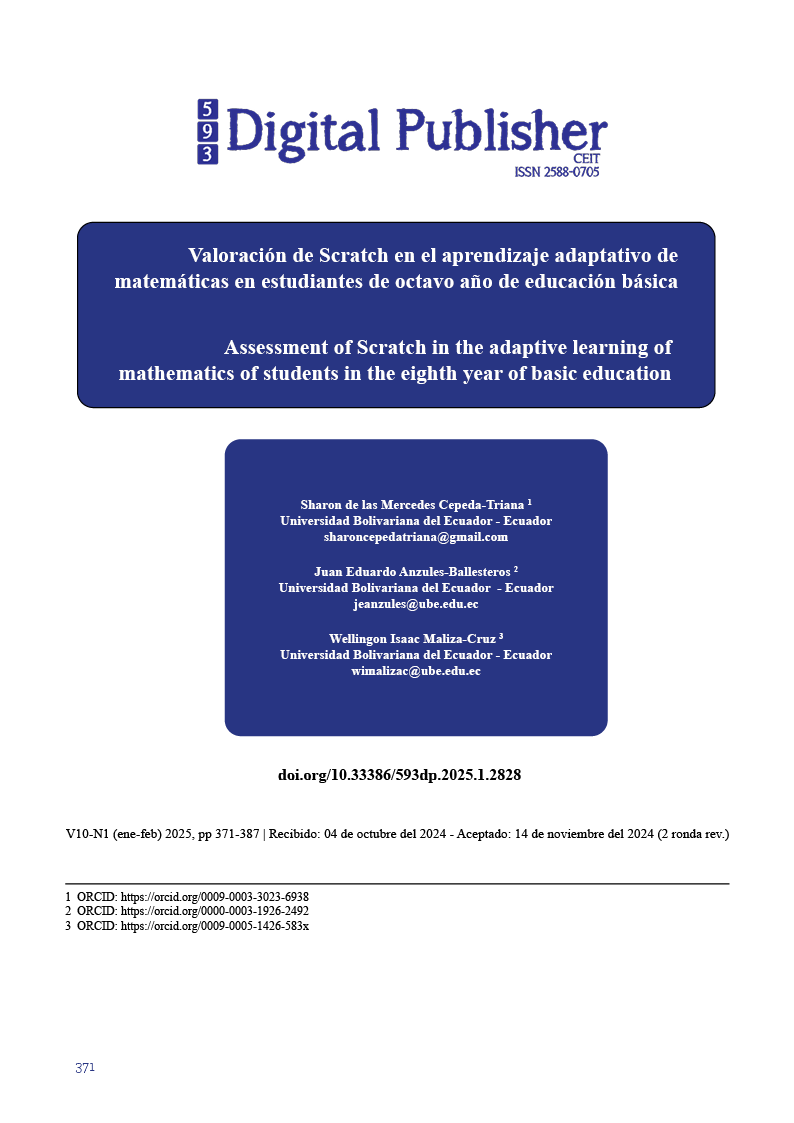Assessment of Scratch in the adaptive learning of mathematics of students in the eighth year of basic education
Main Article Content
Abstract
The present study justifies the need to explore the impact of technological tools such as Scratch on mathematical learning, given the growing interest in innovative educational methodologies. The introduction states that the integration of digital technologies in education can improve students' understanding and performance in mathematics. The objectives focused on evaluating students' perception of Scratch and its relationship with adaptive learning. The methodology included surveys applied to 81 students, analyzing dimensions such as learning effectiveness, content personalization, motivation and commitment, and challenges and barriers. The main results indicate that a high percentage of students positively value the use of Scratch, with 82.7% willing to participate more actively in class and 76.5% reporting improvements in their mathematical performance. However, technical challenges were identified that affect a significant portion of students. Spearman's correlation showed a strong positive relationship (r = 0.852, p < 0.01) between the assessment of Scratch and adaptive learning, suggesting that positive perceptions about the tool can improve the adaptability and effectiveness of learning. In conclusion, Scratch is presented as a valuable tool to improve performance and participation in mathematics, although it is crucial to address the technical challenges and provide the necessary support to maximize its effectiveness. This study highlights the importance of effectively integrating educational technologies to transform the learning experience and foster a more interactive and adaptive environment.
Downloads
Article Details

This work is licensed under a Creative Commons Attribution-NonCommercial-ShareAlike 4.0 International License.
1. Derechos de autor
Las obras que se publican en 593 Digital Publisher CEIT están sujetas a los siguientes términos:
1.1. 593 Digital Publisher CEIT, conserva los derechos patrimoniales (copyright) de las obras publicadas, favorece y permite la reutilización de las mismas bajo la licencia Licencia Creative Commons 4.0 de Reconocimiento-NoComercial-CompartirIgual 4.0, por lo cual se pueden copiar, usar, difundir, transmitir y exponer públicamente, siempre que:
1.1.a. Se cite la autoría y fuente original de su publicación (revista, editorial, URL).
1.1.b. No se usen para fines comerciales u onerosos.
1.1.c. Se mencione la existencia y especificaciones de esta licencia de uso.
References
Abril, P. L. R., Rodríguez-Hernández, A. A., & Avella-Forero, F. (2021). Evaluación de simuladores como estrategia para el aprendizaje de la electricidad en la asignatura de física en la educación media. Revista Boletín Redipe, 10(8), Article 8. https://doi.org/10.36260/rbr.v10i8.1401
Afiah, N., Ghozali, M. I. A., Purwati, R., Somantri, S., Mubarok, I., & Agistany, M.
I. (2023). Scratch Learning Media in Science Subjects for Class V SDN 2 Kreyo and SDN 2 Danamulya, Cirebon Regency. International Conference of Bunga Bangsa, 1(2), Article 2.
Aguinaga, D. R., & Palacios, J. P. (2023). Autorregulación del aprendizaje y pensamiento crítico en estudiantes universitarios. Revista Ecuatoriana de Psicología, 6(15), Article 15. https://doi.org/10.33996/repsi.v6i15.92
Álvarez, I., Muñiz, L., Álvarez, I., & Muñiz, L. (2023). Los recursos lúdicos para la mejora de la actitud del alumnado de Educación Primaria hacia el aprendizaje de la geometría. Educación matemática, 35(2), 268-292. https://doi.org/10.24844/em3502.11
Amaral, J. A. A. do. (2023). Using Scratch to Teach Coding in Massive Online Open Courses: A Systemic Analysis. Journal of Problem Based Learning in Higher Education 11(3),Article 3. https://doi.org/10.54337/ojs.jpblhe.v11i3.7390
Andrade, C., Cecibel, G., Ordóñez, E., & Armando, W. (2021). Las Tics como herramienta metodológica en matemática.
Avilán, E. Y., & Sanabria, J. W. (2023). Propuesta Pedagógica a Través de Simuladores Para el Desarrollo de Competencias en la Solución de Problemas Matemáticos en los Estudiantes de Quinto Grado en el Municipio de Cajibio-Cauca. https://repositorio.udes.edu.co/entities/publication/f089e131-d4bc-4f66- ae11-702b49928ea3
Carrillo, J., Muñoz, M., Fernández, T., Liñán, M., & Arsinas, Á. (2018). Didáctica de las matemáticas para maestros de Educación Infantil. Ediciones Paraninfo, S.A.
Fitriani, M. A., Nurlina, L., Wicaksono, A. P., & Febrianto, D. C. (2024). Pelatihan Pengenalan Basic Programming Menggunakan Scratch bagi Tenaga Pengajar Sekolah Dasar Muhammadiyah Danaraja. Jurnal Pengabdian Teknik dan Sains (JPTS), 4(1), Article 1. https://doi.org/10.30595/jpts.v4i1.21161
Gratani, F., & Capolla, L. M. (2023). Maker Education and semplexity. Rethinking education to address emerging complexity. Form@re - Open Journal per La Formazione in Rete, 23(1), Article 1. https://doi.org/10.36253/form- 13643
Han, J., Kim, K. H., Rhee, W., & Cho, Y. H. (2021a). Paneles de análisis de aprendizaje para el apoyo adaptativo en la argumentación colaborativa cara a cara. Computers & Education, 163, 104041. https://doi.org/10.1016/j.compedu.2020.104041
Han, J., Kim, K. H., Rhee, W., & Cho, Y. H. (2021b). Paneles de análisis de aprendizaje para el apoyo adaptativo en la argumentación colaborativa cara a cara. Computers & Education, 163, 104041. https://doi.org/10.1016/j.compedu.2020.104041
Ingeniería (ITCA-FEPADE), E. E. en. (2023). Fortalecimiento de competencias en matemática para estudiantes de tercer grado aplicando programación Scratch como herramienta de apoyo. http://redicces.org.sv/jspui/handle/10972/5140
Kim, H. (2023). ENHANCING PRESERVICE TEACHERS’ COMPUTATIONAL THINKING SKILLS THROUGH CODING IN SCIENCE CLASSROOMS. ICERI2023 Proceedings, 8547-8547. https://doi.org/10.21125/iceri.2023.2177
Laylo, B., & Malika, D. (2023). CAPABILITIES OF SCRATCH FOR WORKING
WITH ANIMATIONS. Galaxy International Interdisciplinary Research Journal, 11(11), Article 11.
Nurjaman, C., Muzdalipah, I., & Kurniawan, D. (2023). DEVELOPMENT OF SCRATCH-BASED TEACHING MATERIALS ON TRIANGLES AND RECTANGULAR. https://doi.org/10.35194/cp.v0i0.2978
Papak, P. P., Mezak, J., & Vujičić, L. (2023). EDUCATIONAL TECHNOLOGY IN PROBLEM-BASED LEARNING.
Peppler, K., & Kafai, Y. (2019). Making games, art, and animations with Scratch. https://escholarship.org/uc/item/3d33v38w
Sacristán, A. I. (2023). Digital Technologies, Cultures and Mathematics Education.
Sáez-López, J. M., González-Calero, J. A., Cózar-Gutierrez, R., & del Olmo- Muñoz, J. (2023). Scratch and unity design in elementary education: A study in initial teacher training. Journal of Computer Assisted Learning, 39(5), 1528-1538. https://doi.org/10.1111/jcal.12815
Santiago, J. G. (2023). Scratch como herramienta didáctica. Con-Ciencia Boletín Científico de la Escuela Preparatoria No. 3, 10(20), Article 20.
https://doi.org/10.29057/prepa3.v10i20.10702
Scratch. (2024). Scratch—Imagine, Program, Share. https://scratch.mit.edu/ Sellami, H. M. (2023). Sensitize engineers to serious games via scratch. Education and Information Technologies. https://doi.org/10.1007/s10639- 023-12264-9
Torres, Á. E. (2023). Gamificación con Scratch para mejorar la escritura de palabras con tilde en estudiantes de sexto grado de la Unidad Educativa Fiscomisional La Inmaculada [masterThesis, Universidad Nacional de Educación]. http://repositorio.unae.edu.ec/handle/56000/3224
Torres, Z. N. F., Souza, V. F. D., & Oliveira, C. G. (2023). Da programação à Transformação Social: Relato de experiência da oficina de introdução à programação com Scratch para construção de aplicações voltadas a problemas sociais. Workshop de Informática na Escola (WIE), 614-623. https://doi.org/10.5753/wie.2023.235185
Verrelli, C. M., Arayshi, M. E., & Tiberti, M. (2023). Kids in Control: Educational Activity and Devices for International School Students. IFAC- PapersOnLine, 56(2), 7549-7554. https://doi.org/10.1016/j.ifacol.2023.10.656
Wilmer, H., Schulz, T., Fernández-Giménez, M. E., Derner, J. D., Porensky, L. M., Augustine, D. J., Ritten, J., Dwyer, A., & Meade, R. (2021). Lecciones de aprendizaje social de la gestión colaborativa y adaptativa de pastizales. Rangelands. https://doi.org/10.1016/j.rala.2021.02.002
ZAHRA, D., Elfiza, R., & Nopita, D. (2023). DEVELOPING SCRATCH PROGRAM FOR TEACHING LISTENING IN REPORT TEXT AT GRADE
[Masters, Universitas Maritim Raja Ali Haji]. https://lib.umrah.ac.id/




